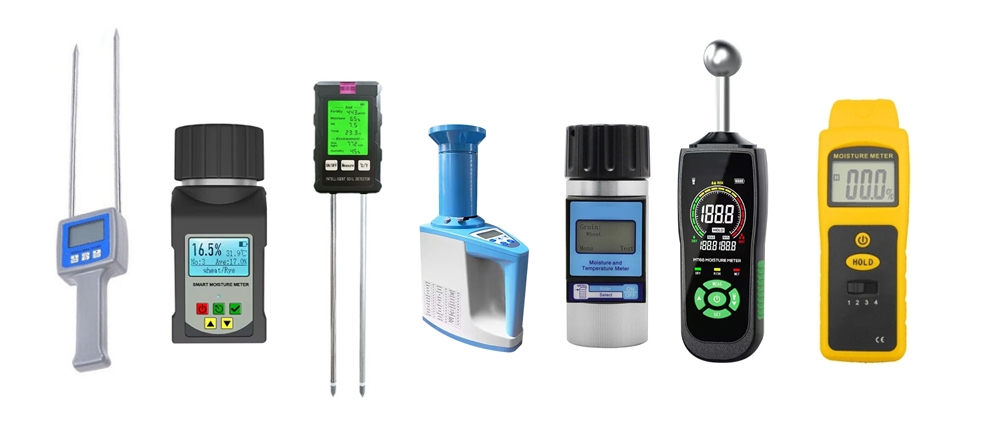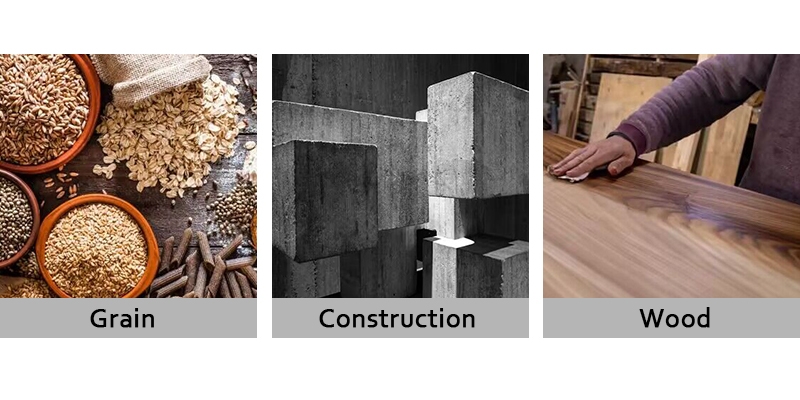Moisture Meter
Digital Humidity Meter for Soil
Grain Moisture Meter for Corn/Bean
Textile/Cotton Humidity Meter
Digital Grain Moisture Detector
Moisture Meter for Walls
Handheld Humidity Meter for Grain
Pinless Wood Moisture Meter
Pin Moisture Meter for Grain
Concrete Portable Moisture Detector
Moisture meters are essential tools used to measure the moisture content in various materials, ensuring optimal conditions in fields like agriculture, construction, textiles, and woodworking. Whether you're a farmer checking soil and grain moisture, a contractor monitoring concrete dryness, or a textile manufacturer ensuring fabric quality, the right moisture meter makes a significant impact on the accuracy and efficiency of your work.

Agriculture and Grain Handling
In agriculture, controlling moisture levels in soil and grain is vital for both crop health and post-harvest quality. Moisture meters for soil provide accurate readings that help optimize irrigation, ensuring crops receive the right amount of water. For grain handling, specialized moisture meters allow farmers and traders to check the moisture content of crops like corn and beans, preventing spoilage and ensuring the grain is stored and processed under ideal conditions. These tools are available in both portable handheld versions and advanced digital models, offering flexibility for fieldwork and grain storage facilities.
Construction and Building Maintenance
Moisture meters are crucial in the construction industry for monitoring moisture levels in materials like concrete and walls. Excessive moisture in building materials can lead to structural damage, mold growth, and compromised safety. Concrete moisture detectors are designed to measure the moisture content in cement before sealing or finishing, ensuring the structural integrity of buildings. Wall moisture meters are ideal for detecting moisture behind drywall, plaster, or masonry, which can help prevent long-term damage during renovation or home inspection projects.
Wood and Textile Industries
For woodworking and textile production, maintaining appropriate moisture levels is essential for material quality and longevity. In the woodworking sector, both pin-type and pinless moisture meters are used to check moisture content in raw and finished wood. Pinless models are particularly useful for measuring moisture without leaving marks on delicate surfaces. In the textile industry, humidity meters help manufacturers monitor moisture content in fabrics such as cotton to ensure the materials remain within the required specifications for production, preventing shrinkage or damage.
Versatile Measurement Technologies
Moisture meters come in different types to suit various applications. Pin-type moisture meters use probes to penetrate materials for deeper readings, making them suitable for materials like grain, wood, or concrete. Pinless moisture meters, on the other hand, use non-invasive electromagnetic sensors to gauge moisture content, making them ideal for finished materials that require surface preservation. Whether you're measuring soil moisture, grain humidity, or the moisture in walls, we offer a range of moisture meters equipped with advanced digital displays, data logging, and adjustable settings for precise and reliable results.

Key Features and Benefits
Modern moisture meters are designed with user-friendly interfaces and cutting-edge technology to ensure accurate and consistent readings across various environments. Many models feature:
- Digital Displays: Clear, easy-to-read screens that show precise measurements, even in low-light conditions, allowing users to quickly interpret data.
- High Accuracy: Whether for deep penetration into materials or surface readings, moisture meters are calibrated to provide highly accurate results, essential for professional-grade inspections and quality control.
- Data Logging Capabilities: Some models offer the ability to store and log data over time, enabling users to track moisture levels and generate reports for long-term projects or compliance purposes.
- Durability and Portability: Designed to withstand tough working conditions, many moisture meters are built with rugged materials and compact designs, making them easy to transport and reliable for both indoor and outdoor use.
Advanced Technologies
In addition to standard moisture detection, advanced moisture meters often integrate innovative features to improve user experience and data accuracy:
- Auto Calibration: Ensures consistent performance without the need for frequent manual adjustments.
- Multiple Measurement Modes: Allows switching between materials (wood, concrete, soil, etc.) to provide precise readings tailored to the medium.
- Alarm and Alert Functions: Programmable moisture thresholds can trigger alarms when readings exceed safe levels, ensuring quick response to moisture issues before they become costly problems.
Applications Beyond Industrial Use
While moisture meters are essential in professional fields like construction, agriculture, and textiles, they also have practical uses for homeowners, DIY enthusiasts, and hobbyists. For example, moisture meters can help identify moisture issues in home basements or walls, preventing mold development and preserving the structural integrity of residential properties. Woodworkers and craft enthusiasts use these tools to ensure the moisture levels in their projects are ideal, avoiding warping or cracking in finished pieces.










